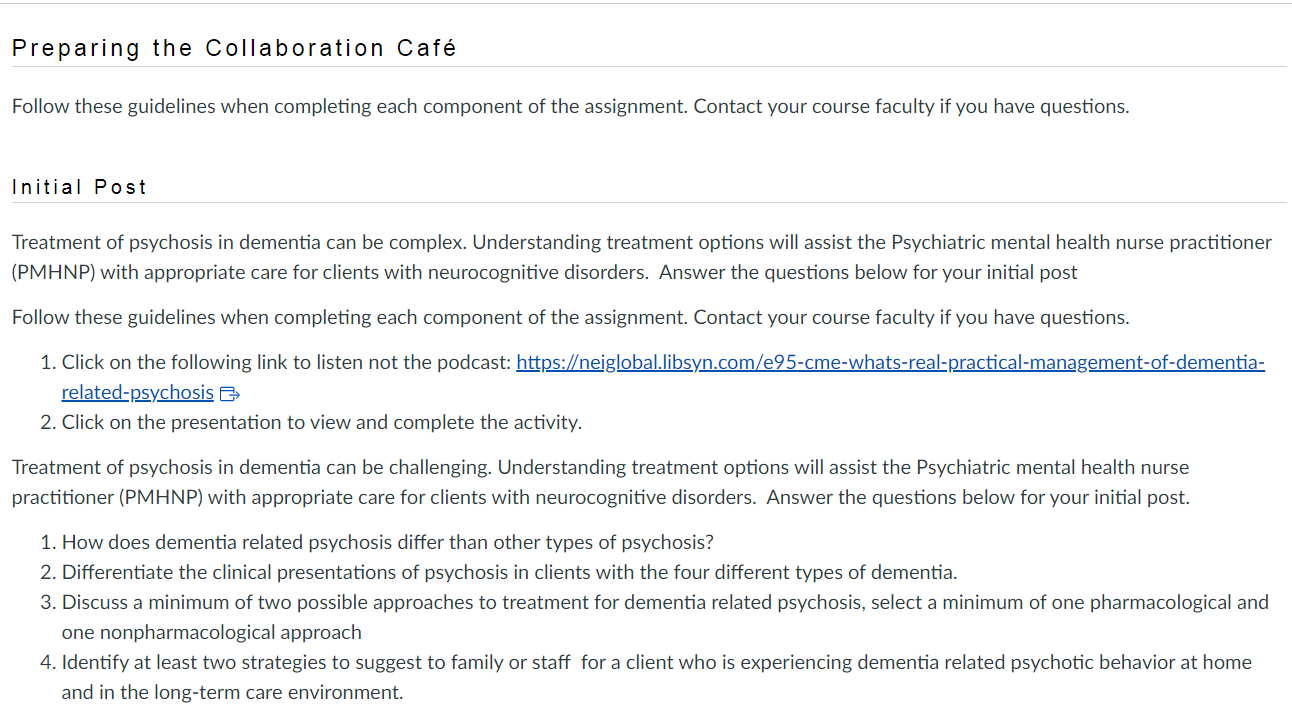CLASS:
NR547: Differential Diagnosis in Psychiatric-Mental Health across the Lifespan Practicum
Preparing the Collaboration Café
Follow these guidelines when completing each component of the assignment. Contact your course faculty if you have questions.
Initial Post
Treatment of psychosis in dementia can be complex. Understanding treatment options will assist the Psychiatric mental health nurse practitioner (PMHNP) with appropriate care for clients with neurocognitive disorders. Answer the questions below for your initial post
Follow these guidelines when completing each component of the assignment. Contact your course faculty if you have questions.
- Click on the following link to listen not the podcast: https://neiglobal.libsyn.com/e95-cme-whats-real-practical-management-of-dementia-related-psychosisLinks to an external site.
- Click on the presentation to view and complete the activity.
Treatment of psychosis in dementia can be challenging. Understanding treatment options will assist the Psychiatric mental health nurse practitioner (PMHNP) with appropriate care for clients with neurocognitive disorders. Answer the questions below for your initial post.
- How does dementia related psychosis differ than other types of psychosis?
- Differentiate the clinical presentations of psychosis in clients with the four different types of dementia.
- Discuss a minimum of two possible approaches to treatment for dementia related psychosis, select a minimum of one pharmacological and one nonpharmacological approach
- Identify at least two strategies to suggest to family or staff for a client who is experiencing dementia related psychotic behavior at home and in the long-term care environment.
SOLUTION
Dementia-related psychosis is a distinct subset of psychotic disorders driven by neurodegenerative changes in the brain. While psychosis in conditions like schizophrenia or mood disorders originates primarily from neurotransmitter imbalances, dementia-related psychosis arises from progressive structural brain damage caused by conditions such as Alzheimer’s disease, Lewy body dementia, vascular dementia, or frontotemporal dementia.
Key Differences Between Dementia-Related Psychosis and Other Psychoses:
- Underlying Pathophysiology:
- Dementia-related psychosis is associated with neurodegeneration, amyloid plaques, tau tangles, and Lewy bodies affecting brain regions like the frontal cortex, hippocampus, and temporal lobes.
- In schizophrenia, psychosis results from dopamine dysregulation and altered glutamate pathways.
- Age of Onset:
- Dementia-related psychosis typically occurs in older adults, usually over 65 years of age.
- Primary psychotic disorders like schizophrenia often manifest in late adolescence or early adulthood.
- Cognitive Decline:
- Dementia-related psychosis is accompanied by progressive cognitive impairments such as memory loss, executive dysfunction, and impaired judgment.
- In schizophrenia, cognition may be impaired but not progressively deteriorating over time………………………………………………$5

Reviews
There are no reviews yet.